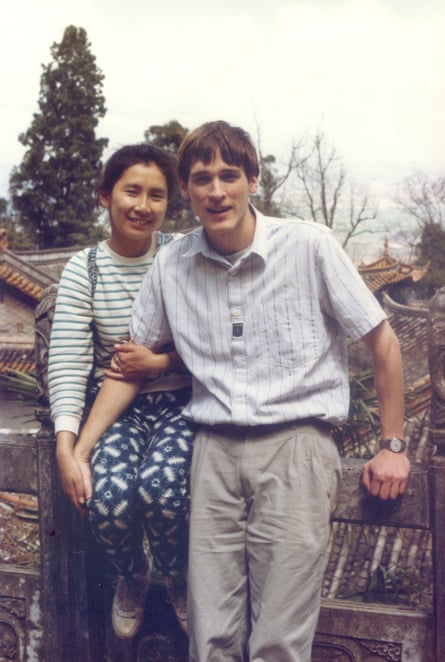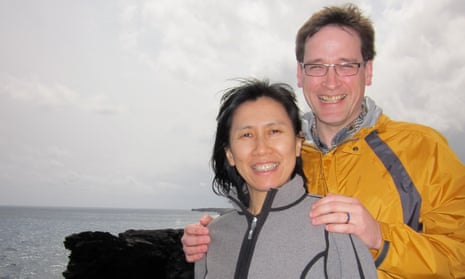David had just graduated in the US when he went to China, aged 22, to teach English, with one instruction from the dean of his college: not to fall in love. “So I didn’t have any sort of intentions of romantic involvement at all,” he says. He arrived at Yunnan University in the summer of 1989, weeks after the protests in Tiananmen Square.
In October, he asked to accompany a British teacher on a three-day trip through Yunnan province. She had already asked Yurong, who had studied English at university, to go with her as a translator. “I was waiting for them at the bus stop and, when they walked over, he was this tall, young guy,” says Yurong.
They spent all of their first day on the train. “Peasants got on and got off with their livestock, their grain,” says Yurong. “There were people selling food. David was able to speak some basic Chinese, but I was the main person who helped them to communicate. He was sitting across from me and I was looking at him thinking: ‘His eyes are really beautiful.’ He was also very easy to talk to.”
What does David remember about Yurong? “The Chinese wanted to treat foreigners in a very particular way, keep us in our own corner, but she was very laid-back,” he says. He was concerned she would think he wasn’t up to eating local food and feared three days of bland, foreigner-friendly dishes. “I said: ‘Make sure mine are spicy.’ She turned to the guy that was selling the noodles and said: ‘He wants his extra-spicy.’ I was eating this bowl of chilli noodles and she was smiling at me – she had a sense of humour, which I was attracted to.”

When did they realise they had feelings for each other? “Day two,” says David. They both laugh. Their companion went to bed early and David and Yurong took a walk along the railway tracks out into the fields. “We made lots of jokes about what was surrounding us, the people walking by. Getting to know each other,” says Yurong. She was walking on the rail, with David holding her hand – “to keep her steady”, he says. “It seemed the right moment – and right height? – to kiss, so we did.”
Back in Kunming, they were concerned about rumours of their relationship getting to Yurong’s family. “So, we had to make a decision about our relationship really quickly – there was no halfway,” says David. “By day five, we had decided we did want to be a couple and she had to tell her parents.” They also had to put up with attention from people unused to seeing a western man with a Chinese woman. “It’s almost like you have no privacy,” says Yurong. “We just had to ignore lots of the stares and not be bothered by that.” At the same time, another western teacher called David was rumoured to be seeing several young Chinese women. “When rumours about us got back to my university, they all thought it was that David, not me,” says David. “So we had this unintentional free run for a couple of months.”
Yurong wouldn’t normally have considered marriage so quickly, but they had to think about visas. So, in March 1990, after months of paperwork, they tied the knot. David sent a telegram to the dean of his college: “Regrets. Advice not taken. Am married.”
They moved to the US in July 1990, 10 months after they had met, where they both pursued careers in academia, specialising in Chinese history and occasionally working together. Since then, they have split their time between the US and China, and brought up their two children bilingually and biculturally.
In Mandarin, the same word can be given different meanings by using different tones. “With one word, one tone can mean virtuous and another means stupid. A friend said we were virtuous and I think it’s the other way around, that we were stupid,” says David, with a laugh. “We went into it without realising what was ahead of us and it just worked out.”
Want to share your story? Tell us a little about you, your partner and how you got together by filling in the form here.

Comments (…)
Sign in or create your Guardian account to join the discussion